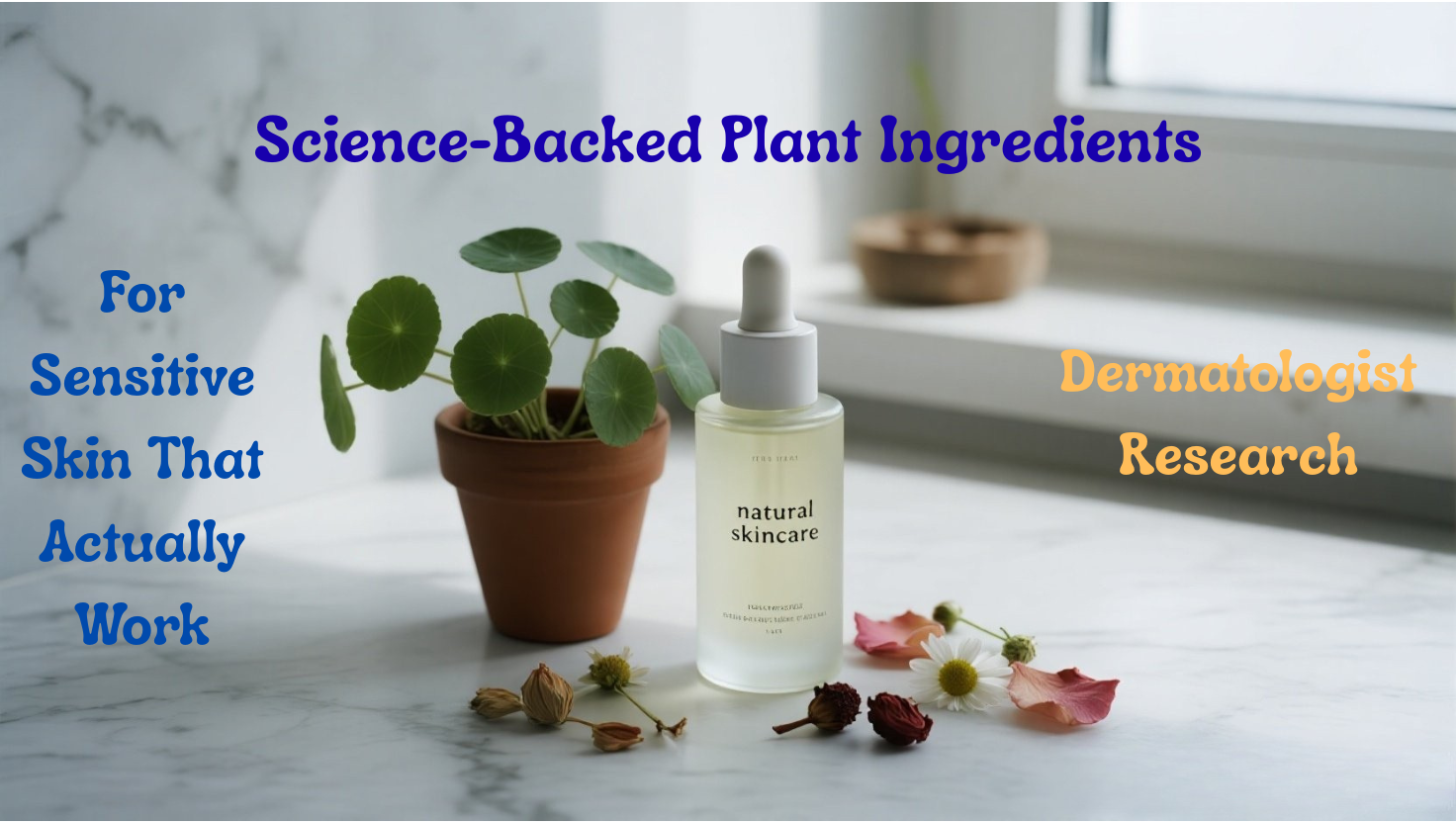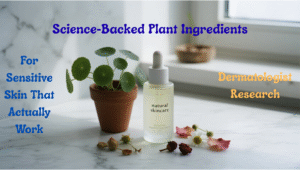How to Soothe Sensitive Skin with Science-Backed Plant Ingredients That Really Work
If you’ve been struggling with sensitive, irritated skin and feel like you’ve tried everything, you’re not alone. The good news? Science is finally catching up with what traditional healers have known for centuries – certain plant-based ingredients can genuinely transform how your skin feels and looks. Let me walk you through some game-changing natural ingredients that have solid research behind them, not just marketing hype.
Why Your Skin Barrier Needs Extra Love (And How to Give It)
Your skin barrier is like your body’s security system – when it’s compromised, everything from pollution to harsh weather can trigger redness, dryness, and that tight, uncomfortable feeling. Recent clinical studies show that strengthening this barrier with the right natural ingredients can significantly reduce sensitivity and improve hydration within just two weeks.
Think of your skin barrier as a brick wall where skin cells are the bricks and natural oils are the mortar. When that mortar starts cracking, irritants sneak through, causing inflammation and discomfort. The key is finding ingredients that can repair those cracks while being gentle enough for daily use.
Centella Asiatica: The “Tiger Grass” That Actually Lives Up to Its Reputation
You might have seen Centella asiatica (also called gotu kola or tiger grass) popping up everywhere lately, and there’s a good reason for the buzz. This humble herb contains powerful compounds called triterpenes – specifically asiaticoside, madecassoside, asiatic acid, and madecassic acid – that have been shown to reduce inflammation, boost collagen production, and strengthen the skin barrier.
What makes Centella special is how it works on multiple levels. Research shows it promotes fibroblast proliferation and collagen synthesis, which means it’s not just calming inflammation temporarily – it’s actually helping your skin repair itself. In a recent study with 88 women with sensitive skin, a cream containing Centella asiatica leaf extract significantly reduced dryness and redness within just one week.
For sensitive skin, this ingredient is particularly valuable because clinical trials demonstrate it increases skin hydration while reducing transepidermal water loss – basically helping your skin hold onto moisture better. If you’re dealing with conditions like eczema or rosacea, this could be a game-changer.
The Vitamin C Revolution: Why Fresh is Best for Gentle Results
Vitamin C gets a lot of attention in skincare, and for good reason. It’s one of the few ingredients with rigorous scientific evidence showing it can brighten skin, stimulate collagen production, and protect against free radical damage. But here’s what many people don’t know – not all vitamin C is created equal.
The most stable and well-researched form is L-ascorbic acid, but for sensitive skin, gentler derivatives like magnesium ascorbyl phosphate or sodium ascorbyl phosphate can provide similar benefits without irritation. The key is starting slowly – even a 5% concentration can deliver visible improvements in skin texture and tone over 8-12 weeks.
What makes vitamin C particularly exciting for natural beauty enthusiasts is that it works synergistically with other plant-based antioxidants like green tea and pomegranate extracts, creating a protective shield against environmental damage.
Niacinamide: The Multi-Tasking Marvel Your Skin Barrier Craves
If there’s one ingredient that deserves a permanent spot in your routine, it’s niacinamide (vitamin B3). A comprehensive 2024 review published in Antioxidants found that topical niacinamide has been proven effective in clinical trials for acne, melasma, eczema, rosacea, and even wrinkles.
What makes niacinamide so special? It increases ceramide and fatty acid production in your skin, essentially helping rebuild that protective barrier we talked about earlier. Clinical studies show 5% niacinamide can visibly improve skin texture and tone over 8-12 weeks.
For sensitive skin, niacinamide is particularly valuable because it reduces inflammation while strengthening your skin’s natural defenses. Unlike some active ingredients that can cause initial irritation, niacinamide tends to be well-tolerated from day one.
Plant Oils That Science Actually Recommends
The world of facial oils can feel overwhelming, but research shows that certain plant-derived oils like camellia, baobab, and sea buckthorn are loaded with essential fatty acids, vitamins, and antioxidants that help soothe irritation and lock in moisture.
Recent studies on camellia oil show it has significant antioxidant, anti-inflammatory, and moisturizing effects, making it particularly suitable for sensitive skin types. These oils work by mimicking your skin’s natural sebum, helping restore balance without clogging pores.
The key is choosing oils based on your specific skin needs. For inflammation-prone skin, look for oils high in omega-3 fatty acids. For dryness, focus on those rich in ceramides and squalane.
The Fermentation Factor: Why Your Skin Loves Probiotic Ingredients
Bio-fermentation is revolutionizing natural skincare by taking ingredients like rice, kombucha, or algae and fermenting them to unlock nutrients that are more bioavailable – meaning your skin can absorb and use them more effectively.
Fermented ingredients also naturally support your skin’s microbiome, which is crucial for maintaining healthy, balanced skin. Think of it as probiotics for your face – these beneficial bacteria help crowd out harmful microorganisms that can cause irritation and breakouts.
Bakuchiol: The Gentle Retinol Alternative That Actually Works
If you want the benefits of retinol – smoother skin, fewer fine lines, more even tone – but can’t tolerate the irritation, bakuchiol might be your answer. This plant-derived ingredient works similarly to retinol by stimulating cell turnover and boosting collagen production, but it’s much gentler and more stable.
While bakuchiol has a different chemical structure than retinol, studies show it can help reduce visible signs of aging and hyperpigmentation without the sun sensitivity and irritation associated with traditional retinoids.
Creating Your Science-Based Natural Routine
Building an effective natural skincare routine doesn’t mean you need ten different products. Start with these evidence-based basics:
Morning:
- Gentle cleanser with natural surfactants
- Vitamin C serum (start with 5-10%)
- Niacinamide moisturizer
- Broad-spectrum sunscreen (non-negotiable!)
Evening:
- Double cleanse if wearing makeup
- Centella asiatica toner or essence
- Bakuchiol serum (2-3 times per week to start)
- Rich moisturizer with plant oils
The Bottom Line: Natural Doesn’t Mean Unscientific
The beauty industry has come a long way from the days when “natural” meant “unproven.” Today’s natural skincare ingredients are backed by rigorous scientific research, with clinical trials demonstrating their effectiveness for various skin concerns.
The key is looking beyond marketing claims and seeking out products that contain clinically-proven concentrations of these beneficial compounds. Your skin deserves ingredients that are both gentle and effective – and now you know exactly which ones science supports.
Remember, the best skincare routine is one you’ll actually stick to. Start slowly, introduce one new ingredient at a time, and give your skin at least 4-6 weeks to show improvement. Your future self will thank you for taking the time to build a routine based on science, not just trends.
Always patch test new ingredients and consult with a dermatologist if you have persistent skin concerns or known allergies.














Post Comment